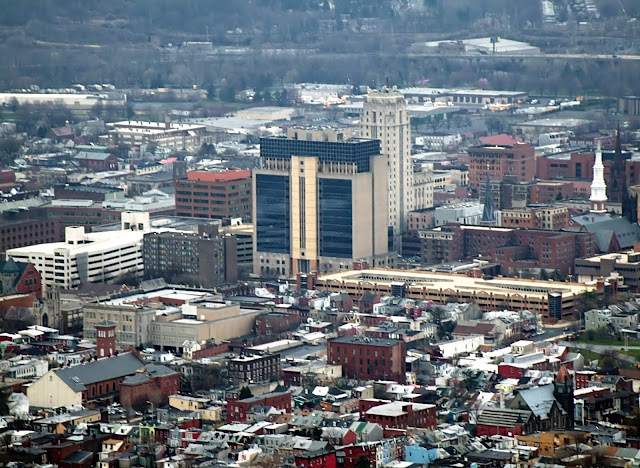Insight into Sweat: Camaraderie in a Company Town
By Elspeth Sweatman
 |
|
Downtown Reading, Berks County, Pennsylvania, April 2011. Photo by Nicholas A. Tonelli.
Courtesy Flickr.
|
Riveting, jacking, stoking, drilling: these are dangerous, labor-intensive jobs. At every plant, there are the folkloric (and true) stories of someone on the job who got seriously injured—like Stan was before he began managing the bar in Sweat—or died, crushed under machinery or dissolved in molten steel. To survive this perilous world and meet the daily production quotas, workers band together; they rely on each other.
The camaraderie that these manufacturing jobs foster is at the heart of Sweat. Tracey, Cynthia, Jessie, and Stan were brought together by working at Reading’s fictional steel tubing plant. They’ve become each other’s chosen family, tied just as strongly as biological families—both to each other and to the plant. Like Chris and Jason in Sweat, children grow up to the pulse of shift work and often follow their parents into these industrial jobs. Or at least they planned to.
When manufacturing jobs declined in the 1980s, ’90s, and early 2000s, many of these institutions found it difficult to keep going and shuttered. After the closing of Reading’s Lucent Technologies and Dana Corporation in 2010, the poverty rate rose to 41.3 percent in 2011. Seemingly through no fault of their own, these families’ dreams were gone. “I run the full mile, I put in the time, do the right thing,” says Brucie, “But, dude, tell me what I did wrong, huh?”
Playwright Lynn Nottage was moved by these former line-workers’ plight. She traveled to Pennsylvania and spent many months getting to know real residents affected by steel mill closures, and the unraveling of their American dream inspired Sweat.
To read more, purchase a copy of Words On Plays—available now.

